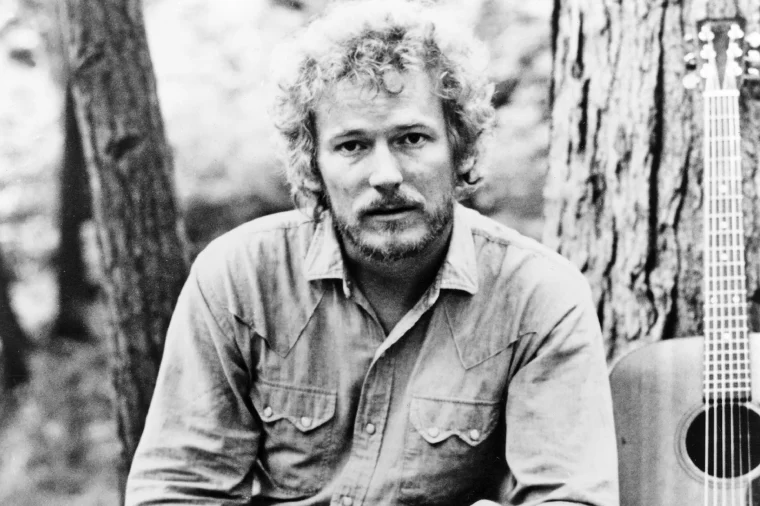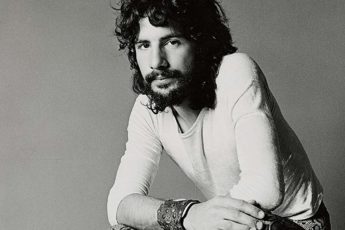Following last weeks passing of Gordon Lightfoot our returning guest writer Shep Cummings reflects on the singer-songwriter’s brilliant career and the impact Lightfoot’s music played on his family in their younger years.
Growing up with my four siblings, we played a lot of records on the only stereo in the house. Over those years, amidst multiple genres of music, a North Star emerged. The one singer we all loved, we all sang along to, and perhaps most importantly brought us all a little closer whenever we heard his voice. That North Star for us was Gordon Lightfoot.
I first heard Gordon (though we never met the man we were always on a first name rapport with him) on a summer evening in 1973 when I was twelve and my older brother arrived home with his Sit Down Young Stranger album featuring the eternal classic ‘If You Could Read My Mind.’ For the decade to follow Gordon’s comforting guitar and eloquent voice would echo through our home like the eighth member of a seven-person family.
To many, Lightfoot is best known for his two biggest commercial hits, ‘Sundown,’ which topped the Billboard charts in 1974, and ‘The Wreck of the Edmund Fitzgerald’ that reached #2 a couple of years later. However, assessing Lightfoot’s career by these two songs would be like measuring a Van Gogh painting by width and length. For Lightfoot aficionados, which we of course considered ourselves, the true brilliance of Gordon’s music was exemplified across a dozen albums released between 1966 – 1978 that included classic LPs such as Lightfoot!, The Way I Feel, Did She Mention My Name?, Back Here on Earth, Summer Side of Life, Don Quixote, Sundown and the Gord’s Gold compilation. On those albums were Lightfoot’s greatest works, which included timeless pieces such as ‘Ribbon of Darkness,’ ‘I’m not Sayin’,’ ‘Song for a Winter’s Night,’ ‘Beautiful,’ ‘Go My Way,’ ‘Talking in Your Sleep’ and the iconic ‘Canadian Railroad Trilogy’ – which to many in Lightfoot’s home country became a pseudo national anthem to them.
Now to be clear, during a heavy party era this was not party music. Nor was it the first album I put on when friends came over (or the second, third or fourth for that matter). But it was special music to each of us personally and together as a family. And I would be less than honest if I said on the whole Gordon’s songs were not mostly wrapped in a melancholy aura, as he often sang of life’s harder realities. To this day I would rank ‘Sixteen Miles (To Seven Lakes)’ and ‘Saturday Clothes’ as the two saddest songs I’ve ever heard, yet there was a uniquely friendly honesty to both of them that I found uplifting. Lightfoot also faced a lifelong battle with alcoholism and ‘Early Mornin’ Rain’ (later covered by both Peter, Paul and Mary and Elvis Presley) and ‘Second Cup of Coffee’ were his personal tributes to that fight.
We all had our favorite Gordon tunes and as much as we all loved them none of them seemed to overlap. My brother’s were ‘Did She Mention My Name?,’ (a song with a happy tempo telling the not so happy story that, in fact, she did not) as well as ‘Looking at the Rain.’ Those of my three sisters’ included ‘Somewhere USA,’ ‘Carefree Highway’ and his beautiful rendition of Phil Ochs’ ‘Changes.’ For me, I go off the beaten path a bit to ‘The Mountains and Marian,’ a descriptive account of crossing the Canadian highways while putting a downcast chapter of life in the rear-view mirror. It featured one of my favorite Lightfoot lyrics: “The losers that I left behind, I’ll think about some other time.”
Regardless of particular favorites, I think most would agree that ‘If You Could Read My Mind’ was the marquee tune and crowning achievement of Lightfoot’s career. To those that loved and appreciated him it will perhaps always be the first song that comes to mind whenever hearing his name. It is true musical poetry in every sense of the word. Each verse and practically every lyric in and of itself would stand out as definitive in almost any other song. Indelible lines like “I will never be set free, as long as I’m a ghost you can’t see” and “The hero would be me, but heroes often fail” all wistfully telling a tale inspired by his first failed marriage. It is a song you could hear a million times, which I think my siblings and I probably have, and still never get tired of it.
So when Gordon passed away last week a streak of sadness hit us, even though with reports of his ailing health in the public domain we knew the day was not far off on the horizon. We have spent the last week reminiscing and recalling our favorite songs and albums and a memorial playlist is in the works. Our North Star is now officially gone, but his halo is with us forever. Gordon was there for us growing up and he’ll be with us for the rest of our ride.
For me personally, I’ve developed an added perspective just in these few days since he departed. My initial memories were of his music being comforting and introspective, a perfect companion for everything from jovial family time to solo moments when my mind wandered aimlessly. However, now I’m thinking more about the admiration and respect I have for him and the role he subconsciously played in my younger years. I guess you could say he was someone who had clearly taken some real hits in life yet lived to sing about it. And in so doing that seemed to tell me that in the end all had turned out alright for him, and whatever problems I thought I had back then would probably be the same. Like so many others, I will always remember Gordon’s touching premise “If you could read my mind” but it is just now that I realize all these years his songs were really reading mine.
For more of Shep’s SMGM contributions, see his past ruminations on Don Henley, Rod Stewart and one of his favorite musical topics, a review of classic ’70’s Story Songs.
And for an even deeper Gordon dive, here is a lengthy tribute recorded by Rick Beato, a true music maven, who it turns out was – like my friend Shep Cummings – an immense (and highly emotional) fan of Gordon Lightfoot.







Leave a Comment